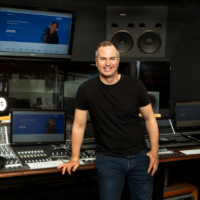Voices has changed its name twice since its inception, moving from Voices.com to the simpler Voices just earlier this year. To get a deeper insight into the story behind the brand, we talk with David Ciccarelli, the CEO and Founder of Voices, about the reasons for a name change, why the previous name was limiting for the business, and what’s on the horizon for Voices.
What is the story behind Voices?
Well, it all boils down to a napkin. Let me explain. After I graduated from the Ontario Institute of Audio Recording Technology (OIART) in London, Ontario, I opened a small recording studio. I actually got my name in the Business London newspaper, on my birthday of all days, and my Mother-in-Law clipped that article out and showed it to Stephanie, who is now my wife. She was a classically trained singer and her mom thought Stephanie should record her repertoire at the studio. So she and her mom came down to the studio and we recorded with me as the sound engineer.
That article also garnered interest from other local businesses, like hair salons and flower shops, who wanted a female voice for their ads. I only knew one girl in the city – Stephanie – so I called her up and asked her if she could read the copy. We ended up working together, with her as the voice talent and myself as the sound engineer.

We started getting inundated with inquiries from voice talent who focused on documentary narration, character voices, spoke multiple languages, and beyond, asking if they could be featured on our website. We always just said yes and hand-coded these profiles for them to showcase their voice demos.
Advertising agencies and video production companies started hiring out these voice actors from our website and that was sort of my proverbial “Aha!” moment. This is when we decided to pivot away from the recording studio and reinvent ourselves as a voice over marketplace, where we could connect voice-buying clients with professional and aspiring voice talent. We mapped out the concept of Voices on a napkin and the rest is history. Now Voices is the number one marketplace for voice over and Stephanie and I are married with four beautiful kids.
When did you start thinking about your brand name and how did you settle on Voices?
When we first launched, we were called InteractiveVoices.com. It was a mouthful but served its purpose. One of the unique elements about our service is that each voice talent got a profile on our website and their address would be, for example, nancy.interactivevoices.com. The name was long and customers often misspelled it. Someone even complained that their fingers got tired from typing it. We were even mistakenly called “voices interactive” or “interactive voice.com.” Furthermore, the name implied that we only provided voices for interactive media when really we offered voice talent who specialized in voice over for everything from radio to television to audiobooks and corporate videos.

The name was long and customers often misspelled it. Someone even complained that their fingers got tired from typing it. We were even mistakenly called “voices interactive” or “interactive voice.com.”
David Ciccarelli, CEO and Founder of Voices
With a list of reasons to do a name change seemingly getting longer by the week, I went on a quest to find the perfect name. Now this was at the height of the Web 2.0 movement, so we brainstormed snazzy web 2.0 names like Vox, Voxy, and Voxio but they were either taken or our offers were declined.
Then it dawned on me. Rather than a name change, perhaps a name shortening would be best. After all, switching from InteractiveVoices to Voices was more like cutting our name in half. It was a simplification rather than a complete overhaul, so we wouldn’t lose the familiarity we had built, but instead would make it easier for our talent and clients moving forward.

Switching from InteractiveVoices to Voices was more like cutting our name in half. It was a simplification rather than a complete overhaul, so we wouldn’t lose the familiarity we had built, but instead would make it easier for our talent and clients moving forward.
David Ciccarelli, CEO and Founder of Voices
What was the reason to get the domain name Voices.com for your brand?
If we were changing our name to Voices.com (which is now simply Voices), we needed the domain name to reflect that. There was just one problem: voices.com was home to a medical journal called “Silencing the critical voices in my head.”
The next step was to reach out to our corporate lawyer and general counsel to ask if he’d approach the seller saying that he’s representing a potential buyer. Would he sell, and if so, at what price?
To my surprise, we got a reply with a price tag of $50,000. That was more cash than we had on hand so I proceeded to set up meetings with every financial institution but I was unsuccessful. Then, our lawyer taught me an important lesson. Never take no for an answer. He suggested that we go back and counter-offer $30,000 and send quarterly payments of $5000 for the next 6 quarters. Now, that was something we could handle. And you know what? The offer was accepted!
With a solid legal agreement in place and for a small investment of $5000, we were able to re-launch our website and start marketing ourselves as “Voices.com.”

How has owning Voices.com affected your business? Do you own any other domain names?
Making the leap from InteractiveVoices.com to Voices.com, though a no-brainer, was indeed an adventure unto itself. The most challenging aspect of the rebrand was ensuring that all of our content moved from one domain to the other seamlessly on our new server. On a communications front, we had the great joy of sharing the news that our name was shorter, spoke (pun intended) to a broader audience, and elevated our brand name to the same level of excellence that we already exhibited as a company online and offline. Before, we were just a website. Now, our brand is viewed as an industry leader and innovator. We went from a three-person operation to 25 full-time employees at the time of rebranding in 2006. We had 10,000 registered users and now we have more than 2 million. Granted, this didn’t happen overnight, but it is evidence that our rebrand was a sound move.
What would you do differently if you were entering your category market as a brand today?
I’d repeat the decisions that proved the test of time, such as acquiring a great domain name that is both memorable and says what we do in a single word. Dictionary word domain names are hard to come by nowadays and likely done through a domain name broker or auction, but looking back, it was one of our best decisions.
If I were entering our market today, I’d personally take more of a visible role in establishing relationships with industry professionals and influencers. Too often, I listened to others’ advice that I shouldn’t speak to so-and-so or was discouraged from attending industry conferences and appearing on podcasts and videos. Consequently, I let others be more visible and as the CEO, I play a unique role that, as Peter Drucker explains, “bridges the outside world (your customers) with the inside world (your employees).”
To make up for a lost time, I’ve made a point to call more customers, send thank you notes, speak on podcasts, and chime in during Clubhouse chats. I even host a monthly opportunity for viewers to ask live questions and get live answers called “Office Hours.” Once industry events begin again, I’ll be present and hope to speak on stage more than ever before, telling our story and sharing our vision for the future.
Dictionary word domain names are hard to come by nowadays and likely done through a domain name broker or auction, but looking back, it was one of our best decisions.
David Ciccarelli, CEO and Founder of Voices
Why should entrepreneurs value their brand?
As an entrepreneur, one of the most crucial things to consider is your brand. This goes beyond just the company name. Your brand is the cumulative outcome of all the experiences, communications, advertisements, and social posts—essentially, anything customer-facing—the public has received or seen from your company. To put it more simply, your brand is the way people feel about you. Branding is the story people hear and tell or share with others.
This is arguably the most important aspect of running a successful business. It’s why marketing and PR efforts are so critical to long-term success. It’s through these efforts and customer experiences that a brand is created and maintained, and since the position of your brand in a customer’s mind is outside your immediate control, it’s worth your time to clearly define what you’re all about, what value you bring to the table, and why audiences should want to do business with you.
Ultimately, if you’ve done it right, branding improves recognition of your company, builds trust, assists with advertising, and maintains existing customers while attracting new ones.

Your brand is the cumulative outcome of all the experiences, communications, advertisements, and social posts—essentially, anything customer-facing—the public has received or seen from your company. To put it more simply, your brand is the way people feel about you. Branding is the story people hear and tell or share with others.
David Ciccarelli, CEO and Founder of Voices
Has the pandemic affected your company in any way? What has changed since?
Like the rest of the world, Voices had to find a way to not only survive but thrive amidst a global pandemic that changed the game on a global scale. This included transitioning staff to remote work, reviewing and adjusting existing policies to better support both staff and clients/talent in a strange new world, discovering new workflow methods, and finding ways to remain innovative and progressive for our customers.
Voices was in a fortunate position to be a solution to a problem that many businesses faced during the pandemic—how to continue their creative projects remotely. We saw an increase in work coming through our platform, with businesses who previously sourced voice over in-person and through agencies turning to us to source voice over from our remote, professional voice actors. We leaned into that development, offering resources to new clients and crafting messaging that let others know that professional and diverse voice over can be easily secured through Voices.
We have released many product improvements this year, including single sign-on and new talent profiles, to help our growing community get more out of our platform. We also announced a name change in January, moving from “Voices.com” to “Voices,” which included the unveiling of a new logo and a sonic logo. We recently launched a Community Forum that’s exclusive to Voices members, helping to strengthen the Voices community. We also have a major launch planned for this summer that will help both sides of our marketplace grow and innovate.
What do you do to make sure your marketing is effective?
The biggest piece in ensuring our marketing efforts are effective is analysis. We’re constantly monitoring and analyzing what’s working well, what could be performing better, and market trends so we can adapt quickly when needed.
In 2017, Forbes shared that the average American sees between 4k to 10k ads each and every day. This means we’re always making sure our marketing efforts speak directly to our target audiences and stand out as much as possible from other content and advertisements.
We have a fantastic team that works very hard to monitor, analyze, and generate creative ideas and campaigns. We regularly conduct detailed target market analyses that allow us to really hone in on important audiences for growth, which then better permits us to act effectively and efficiently on the results of that data.
What would your advice be to entrepreneurs who are just starting out, in general, and when it comes to branding and naming?
My best advice to entrepreneurs who are just starting out is: know who you are and what defines you. In an age when personal branding is very important, green entrepreneurs need to have a firm grasp of who they are and what they stand for. Personal identity is not the only representative of the individual but also extends to the formation of their company and influences how they do business. When you know who you are and have clarified your calling, it becomes easier to set goals and to determine your vision, mission, and values. Be clear on who you are, what you’re called to do, and why you’re doing it.
This extends to branding and naming. You want a name that isn’t too complex and gives people an idea of what you’re all about, and you want the branding of that name to be honest and true to what you believe in. If you’re able to clearly define your goals, vision, mission, and values, you can then conduct business and marketing efforts with those guidelines in mind, ultimately leading to a brand that’s aligned with the story and message you want to send.
Where do you see your business in the future and how does your brand name fit into that vision?
One of the many things we learned in 2020 is that the future is unpredictable and we need to remain flexible and ready to pivot. We’re working on a big change at Voices that will help broaden the scope of work that is able to be done on our marketplace. What I can tell you with absolute confidence is that the name Voices will always fit into our future vision and the reality of the present.
We hope the above information will help you in making informed decisions about your brand. If you want to say hi or have any questions about naming, branding, and domain names get in touch, we’re always happy to hear from you.
Find out more about Voices

Previous Next